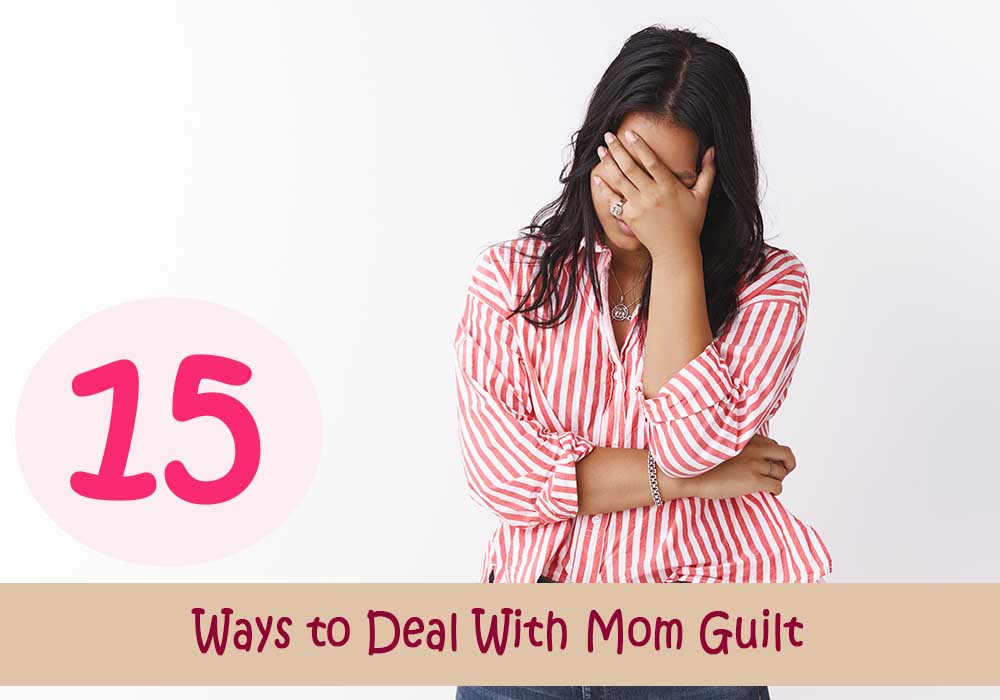As mothers, we frequently have high expectations for ourselves and aim for excellence in all facets of parenting. However, this desire for perfection can result in emotions of mom guilt and inadequacy when we feel as though we are falling short.
The mom’s life is beautiful and comes with love and joy. But it comes with some challenges. One of the everyday struggles many mothers face is mom guilt. This article explores the causes of mom guilt and provides practical strategies to cope with it effectively.

Table of Content
- What is Mom Guilt
- Common Cause of Mom Guilt
- Impact of Mom Guilt
- Other Effects of Mom Guilt
- 15 Ways to Deal with Mom Guilt
- Practice Self-Compassion
- Set Realistic Expectations
- Seek Support from Other Moms
- Make Self-Care a Priority
- Prioritize and Assign Tasks
- Having a Conversation With Your Partner
- Creating a Supportive Network
- Overcoming Comparison Trap
- Accepting Imperfection
- Celebrating Successes
- Accepting Help
- Seeking Professional Guidance
- Balancing Work and Family
- Creating Quality Time with Your Children
- Practising Mindfulness and Stress Management
- Wrapping Things Up on Mom Guilt
- FAQs About Mom Guilt
What is Mom Guilt
Mom guilt refers to the feeling of inadequacy or self-blame experienced by mothers, often triggered by the perception of failing to meet societal or personal expectations in parenting. It is a common phenomenon that affects mothers of all backgrounds.
It develops when we have ongoing self-doubt, fear, and even shame over our parenting choices. Whether we decide to work outside the home, how we discipline our kids, or even just when we take time for ourselves, mom guilt can persist.
This frequently results from our deep love, responsibility, and desire to be the greatest mothers we can be for our children.
Common Cause of Mom Guilt
Mom guilt is a prevalent emotional experience that many mothers go through, often characterized by feelings of self-doubt, inadequacy, and guilt related to their parenting choices and behaviors.
While every mother’s experience is unique, there are some common causes of mom guilt that many women can relate to. Here are a few:
1. Balancing Work and Family
Many mothers struggle with finding the right balance between their professional and family responsibilities. They may feel guilty for not spending enough time with their children or for missing important moments due to work commitments.
2. Self-care
Moms often put their own needs last, prioritizing their children’s well-being above their own. When they take time for themselves or engage in self-care activities, they may experience guilt for not dedicating that time to their children or feeling selfish for prioritizing their own well-being.
3. Parenting Choices
Whether it’s breastfeeding versus formula feeding, co-sleeping or sleep training, discipline methods, or educational choices, mothers often second-guess their decisions and feel guilty if they believe they’ve made the wrong choice for their child.
4. Comparison and Judgment
The rise of social media and constant exposure to curated images of seemingly perfect parenting can lead to feelings of inadequacy. Mothers may compare themselves to other moms and feel guilty for not living up to the unrealistic standards set by society.
5. Time Spent Away From Children
Whether it’s going back to work, running errands, or pursuing personal interests, mothers may feel guilty for taking time away from their children, fearing that they are missing out on important moments or not being fully present in their child’s life.
6. Not Being “Enough”
Mothers often set high expectations for themselves, wanting to be the perfect parent in every aspect. When they feel they fall short, whether it’s in patience, energy, or providing for their child’s needs, they may experience guilt and self-blame.
7. Self-Perceived Failures
Mothers can be particularly hard on themselves when they believe they’ve made mistakes or have not met their own standards. This could include instances of losing patience, not handling a situation as they would have liked, or feeling overwhelmed by the demands of motherhood.
Impacts of Mom Guilt
1. Unrealistic Expectations of Being a “Perfect” Mom
Many mothers feel the pressure to meet society’s idealized image of a perfect mom. This entails maintaining an immaculate home, raising kids who are always well-behaved, and being an excellent parent in every way.
“Aiming for perfection is unachievable and might induce shame when we don’t live up to particular standards”
Social media sites frequently accentuate the best aspects of other people’s lives, especially the picture-perfect moments of motherhood. When you compare yourself to these curated images, it can trigger feelings of inadequacy and guilt, as you may feel you are falling short in comparison.
2. Balancing Work and Family Responsibilities
Many mothers juggle multiple roles, including being a parent and having work or career obligations. Balancing these responsibilities can be challenging, as it requires dividing time and energy between family and work.
Mothers may feel guilty that they aren’t doing their jobs well when they believe they can’t provide the same amount of attention.
3. Fear of Making Mistakes and Self-doubt
Motherhood comes with a large sense of responsibility, and mothers may be hesitant to make choices and fret about doing so for fear of doing so in a way that could negatively affect their children.
Feelings of guilt may be exacerbated by the worry that one is not a great parent or that one makes mistakes.
4. Lack of Quality Time With Children
In today’s fast-paced society, moms frequently find themselves bogged down in several commitments, leaving little time for such exchanges. Guilt may develop if you believe you are not spending enough time with your children since you may think you are ignoring their emotional needs.
Finding a balance between self-care and fulfilment and parenting and personal needs can be challenging because mothers have wants and goals outside of becoming parents.
Guilt and a sense of self-neglect might result from feeling as though you are abandoning your needs.
5. Influence of Societal Pressures and Judgments
Society often has certain expectations and standards for mothers, ranging from parenting styles to lifestyle choices. Mothers may feel judged or criticized for not meeting these societal expectations, leading to feelings of guilt.
The pressure to conform and meet the perceived “ideal” can be overwhelming and contribute to mom guilt.
Other Effects of Mom Guilt
Emotional Effects
The emotional health of a mother can suffer from mom’s guilt. It frequently causes emotions of melancholy, annoyance, and anxiety. Mothers may doubt their ability and fret continuously that they aren’t good enough.
Instances
- Feeling a sense of sadness and guilt when leaving your child in daycare or with a babysitter while you go to work.
- Experiencing frustration and self-blame when your child has a tantrum in public, thinking it reflects your parenting skills.
- Constantly worrying about whether you’re doing enough for your child’s development, feeling anxious about every decision you make as a parent.
Mental Effects
The constant pressure of mom guilt can also affect a mother’s mental health. It may contribute to increased stress levels, decreased self-esteem, and even symptoms of depression. Over time, this can have a significant impact on overall mental well-being.
Instances
- Feeling overwhelmed and stressed because of trying to meet unrealistic expectations of being a perfect mom.
- Experiencing a decrease in self-esteem and self-confidence when comparing yourself to other seemingly “perfect” moms.
- Developing symptoms of depression, such as a persistent feeling of sadness and loss of interest in activities you once enjoyed, because of the constant pressure of mom guilt.
Physical Effects
Mom’s guilt can manifest in physical symptoms such as fatigue, headaches, and disrupted sleep patterns. The stress and emotional burden associated with mom guilt can affect a mother’s physical health.
Instances
- Experiencing fatigue and exhaustion from constantly trying to balance multiple responsibilities as a mom.
- Developing frequent headaches or migraines because of the stress and emotional burden associated with mom guilt.
- Having disrupted sleep patterns and difficulty in getting quality sleep as your mind is preoccupied with thoughts of guilt and self-doubt.
15 Ways to Deal With Mom Guilt

1. Practice Self-Compassion
Be kind to yourself and acknowledge that it’s normal to make mistakes. Treat yourself with the same compassion you would offer to a friend in a similar situation.
2. Set Realistic Expectations
Recognize that perfection is unattainable and that being a good mom is more about love, care, and effort rather than achieving perfection.
3. Seek Support from Other Moms
Connect with other moms who understand the challenges and emotions you’re experiencing. Sharing knowledge and suggestions can bolster one’s confidence and sense of support.
4. Make Self-Care a Priority
Set aside time for self-care activities that will help you rest and recover. Making time for oneself is essential, whether it is for reading a book, doing yoga, or engaging in a pastime.
5. Prioritize and Assign Tasks
Decide which duties and obligations are most crucial, then assign them to others when you can. Recognize that you can’t accomplish everything on your own and that it’s good to ask for assistance.
6. Having a Conversation With Your Partner
Keep the lines of communication with your partner regarding your emotions of mom guilt open and honest. Share your worries with one another and collaborate to discover mutually beneficial solutions.
7. Creating a Supportive Network
Surround yourself with friends and family who will understand you and encourage you. Having a strong support system can help ease mom’s guilt.
8. Overcoming Comparison Trap
Avoid comparing yourself to other moms on social media. Remember that what you see online is often a curated highlight reel, and everyone’s journey is unique.
9. Accepting Imperfection
Accept that parenthood comes with imperfections. Instead of aiming for impossible perfection, emphasize the love, attention, and work you put into parenting.
10. Celebrating Successes
Celebrate your mothering successes, no matter how modest they may seem. Recognize your own assets and the beneficial influence you have on your kid’s life.
11. Accepting Help
Give yourself permission to accept assistance from hired professionals, family members, or friends as needed. Delegating tasks or seeking help can ease some pressures and guilt.
12. Seeking Professional Guidance
If mom guilt becomes overwhelming and affects your daily life, consider seeking guidance from a therapist or counsellor who specializes in maternal mental health.
13. Balancing Work and Family
Establish a healthy work-life balance that suits your individual circumstances. Prioritize quality time with your children and establish clear boundaries between work and personal life.
14. Creating Quality Time with Your Children
Focus on creating meaningful experiences and connections with your children. Even short moments of undivided attention can have a significant impact.
15. Practising Mindfulness and Stress Management
Incorporate mindfulness techniques and stress management strategies into your daily routine. This can help you stay present, reduce anxiety, and manage stress effectively.
Wrapping Things Up on Mom Guilt
Mom guilt is a common experience for many mothers, but it doesn’t have to overpower your journey as a mom. By understanding the causes and implementing the coping strategies discussed in this article, you can navigate through mom guilt and embrace the joy of motherhood with more confidence, self-compassion, and fulfilment.
FAQs About Mom Guilt
Is Mom Guilt Only Experienced By Working Mothers?
No, mom guilt can be experienced by mothers in various situations, including working moms, stay-at-home moms, or those who have a combination of work and family responsibilities.
How Can I Overcome The Feeling of Not Being a “Perfect” Mom?
Remind yourself that perfection is unattainable and focus on the love, care, and effort you put into parenting. Set realistic expectations and practice self-compassion.
Can Social Media Contribute To Mom Guilt?
Yes, comparing oneself to the perfect lives portrayed on social media can trigger feelings of mom guilt. Remember that social media often showcases curated moments and not the full reality.
Is Seeking Help a Sign of Weakness As a Mother?
No, seeking help is a sign of strength. Motherhood is a journey that requires support and help from time to time. Accepting help when needed can benefit both you and your family in the long run.



